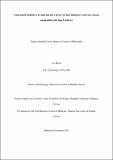| dc.description.abstract | Background Clinic non-attendance among young adults with type 1 diabetes has been widely reported in previous research. Research suggests that regular attendance at diabetes clinics may be particularly important for young adults due to the challenges and risks associated with life as a young adult with type 1 diabetes. Therefore, interventions to improve clinic attendance among young adults with type 1 diabetes are needed. However, due to a lack of research focusing on clinic attendance behaviour, research is needed to develop a theoretical basis for future behaviour change interventions.
Aim The aim of this research is to develop and test a theory of clinic attendance among young adults with type 1 diabetes. This theory will provide a basis for future interventions targeting clinic attendance behaviour in this population.
Methods Following the guidelines of the UK Medical Research Council Framework for developing complex interventions, three studies were conducted in this research to address the three steps in the development phase of this framework. In study 1 a systematic review was conducted to identify the evidence base related to barriers and facilitators to clinic attendance among young adults with type 1 diabetes. A qualitative study involving young adults with type 1 diabetes and diabetes service providers, was conducted in study 2 to develop a theory of clinic attendance. Grounded theory was the method used to guide the approach to data collection and analysis, and theory development. In study 3, the theory of clinic attendance produced by the findings of study 1 and study 2, was tested. Young adults were recruited online and through diabetes clinics in the Republic of Ireland to complete a questionnaire. Structural Equation Modelling and moderation analyses were used to analyse the data.
Findings In study 1, a total of 12 studies (8 quantitative and 4 qualitative) were identified in the systematic review and analysed in a narrative synthesis. Clinic and young adult-related factors, such as difficulties communicating with the clinic and negative perceptions regarding the value of attendance, acted as barriers to adult diabetes clinic attendance in this study. In study 2, opportunities for contact between young adults and service providers facilitated the development of collaborative relationships, resulting in the engagement of young adults with the diabetes clinic. Regular clinic attendance behaviour was established or maintained in this study as a result of good relationships between young adults and service providers due to the increased value of attendance and a reduction in the impact of factors such as distress on attendance. According to the findings of study 3, collaborative relationships between young adults and service providers predicted attendance rates and informal contact, for example by telephone, and the engagement of young adults. The demographic variables gender and treatment modality, but not clinic or young-adult related variables, contributed to the prediction of clinic attendance behaviour in this study. Opportunities for contact between young adults and service providers, and the engagement of young adults, did not predict clinic attendance behaviour.
Conclusion The findings of this research contribute to insights in relation to clinic attendance behaviour and highlight modifiable factors related to clinic attendance. Clinic attendance behaviour comprises attendance at scheduled appointments, and informal contact between appointments to seek support and to cancel and reschedule unsuitable appointments. Interventions designed to improve relationships between young adults and service providers, and remove existing barriers to relationship development may be most effective in improving clinic attendance behaviour. Targets for future interventions may include improving continuity of care during transition and in adult diabetes clinics or supporting effective consultations using patient-centred approaches. | en_IE |


